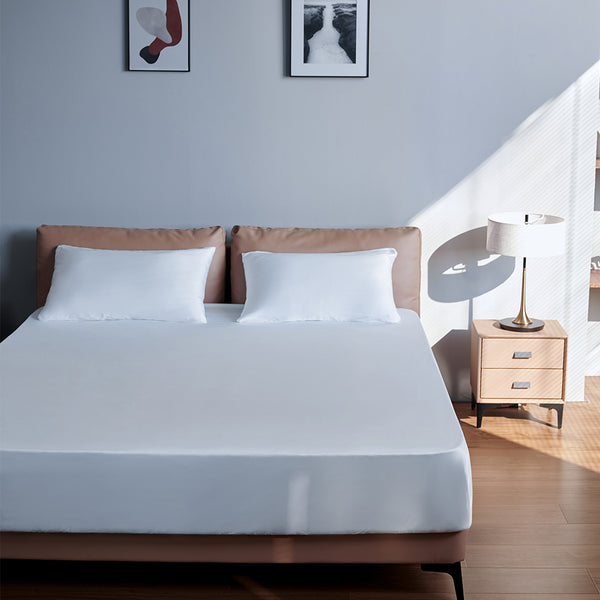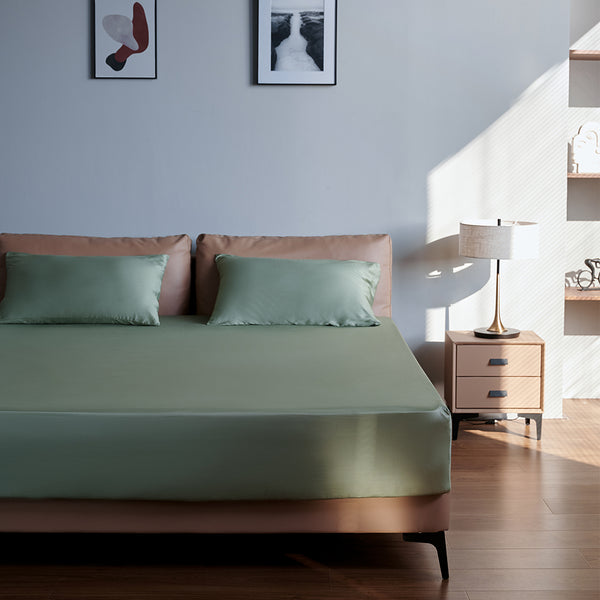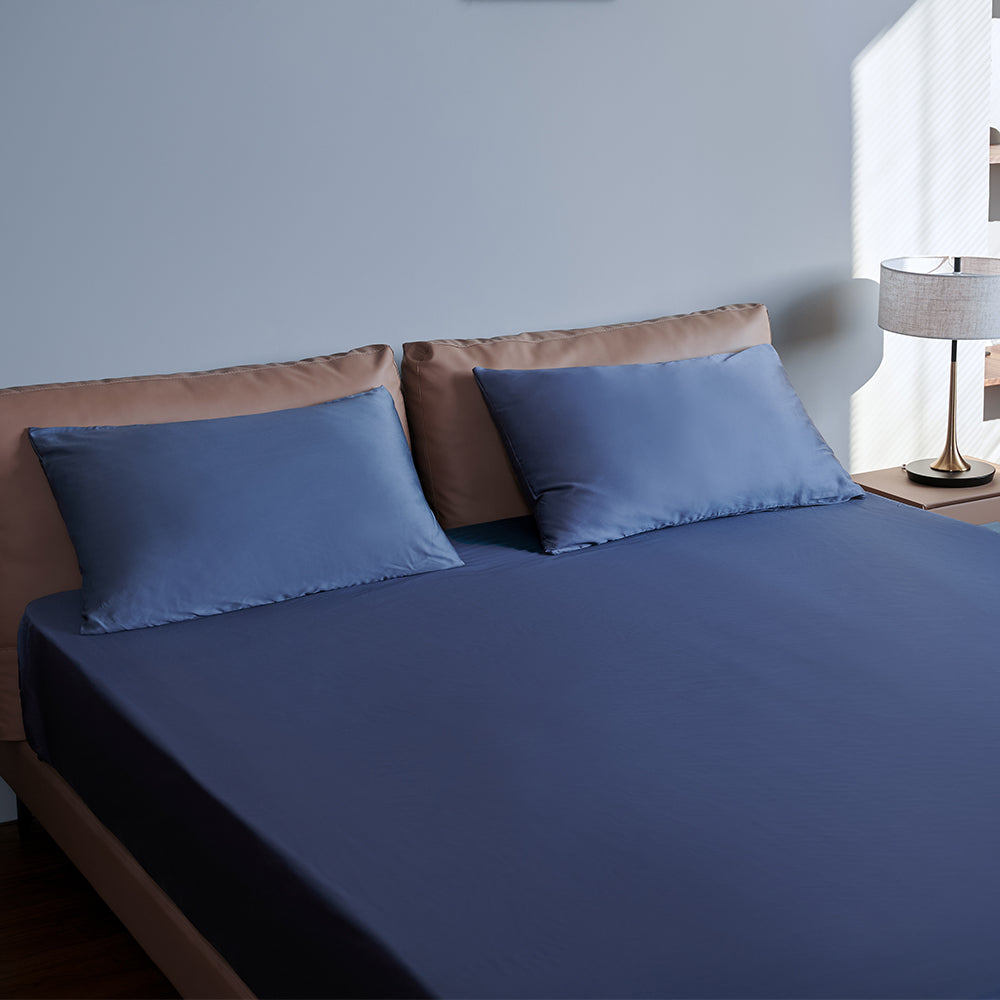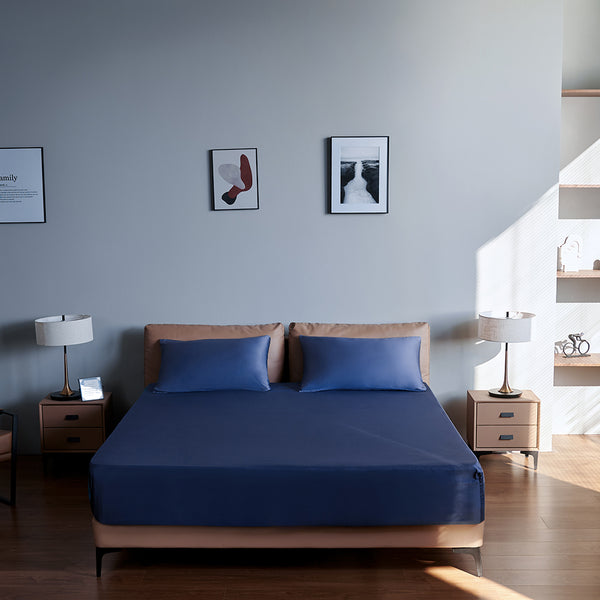In the quest for the perfect night's sleep, the battle of microfiber vs bamboo sheets captures the attention of comfort seekers and sustainability enthusiasts alike. This article delves into the nuances of both materials, offering you a comprehensive guide to make an informed decision for your bedding needs.
Microfiber vs Bamboo Sheets: A Deep Dive into Comfort and Sustainability

When choosing suitable sheets for your bed, understanding the difference between microfiber and bamboo is crucial. Microfiber sheets, known for their durability and affordability, are made from finely woven synthetic fibers. They offer a soft feel and are resistant to wrinkles and pilling. On the other hand, bamboo sheets, such as the Zonli Bamboo Cooling Fitted Sheet, present a natural alternative that champions sustainability without compromising luxury.
The Sustainability Edge
In the microfiber vs bamboo sheets debate, sustainability plays a pivotal role. Bamboo sheets take the lead with their eco-friendly credentials. The Zonli Bamboo Cooling Fitted Sheet, made from 100% bamboo viscose, is a testament to this. This material not only supports environmentally responsible production but also ensures that you're investing in bedding that is both renewable and biodegradable.
Breathability and Comfort
Comfort is paramount, and bamboo sheets often have the upper hand here. It exemplifies this advantage with its breathable weave. This design choice ensures that air circulates freely, maintaining your body at an optimal temperature throughout the night. Unlike some microfiber options that can trap heat, bamboo sheets offer a cooler sleeping experience, making them ideal for warm sleepers.
The Feel Factor
When it comes to the tactile experience, both materials boast unique qualities. Microfiber sheets are soft and can mimic the feel of higher thread-count cotton sheets. However, bamboo sheets, particularly the Zonli Bamboo Cooling Fitted Sheet, elevate the softness.
The silky-soft finish of bamboo viscose is irresistible and gentle on sensitive skin, making it a luxurious choice for those who prioritize comfort in their bedding.
Durability and Care
Durability is another critical factor in the comparison of microfiber vs bamboo sheets. Microfiber sheets are celebrated for strength and longevity, often resisting wear and tear better than traditional cotton.
Bamboo sheets, while durable, require more care to maintain their luxurious feel and appearance. With its continuous elastic hem, the Zonli Bamboo Cooling Fitted Sheet ensures a snug fit that stays in place, combining durability with ease of use.
The Health and Hypoallergenic Advantages of Bamboo Sheets

Choosing bedding material can play a significant role in the ongoing quest for a restful night's sleep, especially for sensitive skin or allergies. Bamboo sheets are increasingly recognized for their comfort, sustainability, health, and hypoallergenic benefits.
Natural Hypoallergenic Properties
One of the most compelling advantages of bamboo sheets is their natural hypoallergenic properties. Bamboo fiber is inherently resistant to bacteria and allergens, making these sheets ideal for individuals with allergies or sensitive skin.
Unlike synthetic fibers found in microfiber sheets, bamboo's organic composition minimizes the risk of allergic reactions, offering a cleaner, more hygienic environment for sleep.
Moisture-Wicking for a Drier Sleep Environment
Bamboo sheets offer superior moisture-wicking capabilities compared to traditional bedding materials. It means they effectively draw moisture away from the skin, keeping you dry and comfortable throughout the night.
For those who tend to sweat during sleep, the Zonli Bamboo Cooling Fitted Sheet can be particularly beneficial, as its breathable weave helps to regulate temperature and reduce the humidity in your bed.
A drier sleep environment not only enhances comfort but also discourages the growth of mold and dust mites, common allergens that can affect health.
Antibacterial and Odor-Resistant Qualities
Another noteworthy feature of bamboo sheets is their natural antibacterial and odor-resistant qualities. The inherent properties of bamboo fibers help to repel bacteria and odors, ensuring your bedding remains fresher for longer.
This antibacterial effect is particularly advantageous for maintaining a clean sleeping area without the frequent use of harsh chemicals found in some cleaning products.
Softness and Skin-Friendly Comfort
Beyond the hypoallergenic and health benefits, bamboo sheets are incredibly soft and gentle on the skin. With its silky-soft finish, the Zonli Bamboo Cooling Fitted Sheet provides a soothing touch for even the most sensitive skin types.
This softness can prevent irritation often accompanying rougher, less breathable fabrics, making bamboo sheets a preferred choice for those with skin conditions such as eczema or dermatitis.
FAQs
Are bamboo sheets better for the environment than microfiber sheets?
Yes, bamboo sheets are generally considered better for the environment. Bamboo is a highly renewable resource that requires less water and no pesticides to grow, making it a more sustainable choice. Products like the Zonli Bamboo Cooling Fitted Sheet are made from 100% bamboo viscose, emphasizing the commitment to eco-friendly bedding solutions.
Do bamboo sheets require special care compared to microfiber sheets?
Bamboo sheets do require a bit of extra care to maintain their softness and durability. It's recommended to wash them in cold water on a gentle cycle and to avoid using bleach or fabric softener, which can break down the fibers over time. In contrast, microfiber sheets are more forgiving and can handle a broader range of washing conditions.
Can bamboo sheets help regulate body temperature during sleep?
Absolutely. Bamboo sheets are known for their excellent breathability and moisture-wicking properties, which help regulate body temperature by keeping you cooler and drier throughout the night. They’re usually crafted with a breathable weave that optimizes your sleeping temperature, offering a comfortable rest for hot sleepers.
Are bamboo sheets worth the investment?
While bamboo sheets typically come at a higher price than microfiber sheets, many find them worthwhile investments. Bamboo sheets' superior softness, sustainability, and temperature-regulating properties offer comfort and eco-friendliness that can justify the cost.
How do microfiber sheets compare in terms of allergy resistance?
Microfiber sheets are known for their hypoallergenic properties, making them a good choice for allergy sufferers. The tightly woven fibers help prevent dust mites, pollen, and other allergens from penetrating the fabric. While bamboo sheets are also hypoallergenic[1], their natural antibacterial and antifungal properties can offer additional protection against allergies, making them an excellent option for sensitive skin or allergy concerns.
What is the lifespan of bamboo sheets compared to microfiber sheets?
Both bamboo and microfiber sheets offer impressive durability when cared for properly. However, if maintained according to manufacturer instructions, bamboo sheets can outlast microfiber sheets due to their natural strength and fabric integrity. They are designed to withstand repeated washings while retaining their softness and comfort, potentially offering a longer lifespan with gentle care.
Wrapping It Up
Navigating the microfiber vs bamboo sheets debate shows that each option has different preferences and priorities. Bamboo sheets, particularly the Zonli Bamboo Cooling Fitted Sheet, present a compelling choice for those leaning towards sustainability, breathability, and luxury.
This exploration not only aids in making an informed decision but also emphasizes the importance of choosing bedding that aligns with your values and comfort needs.


